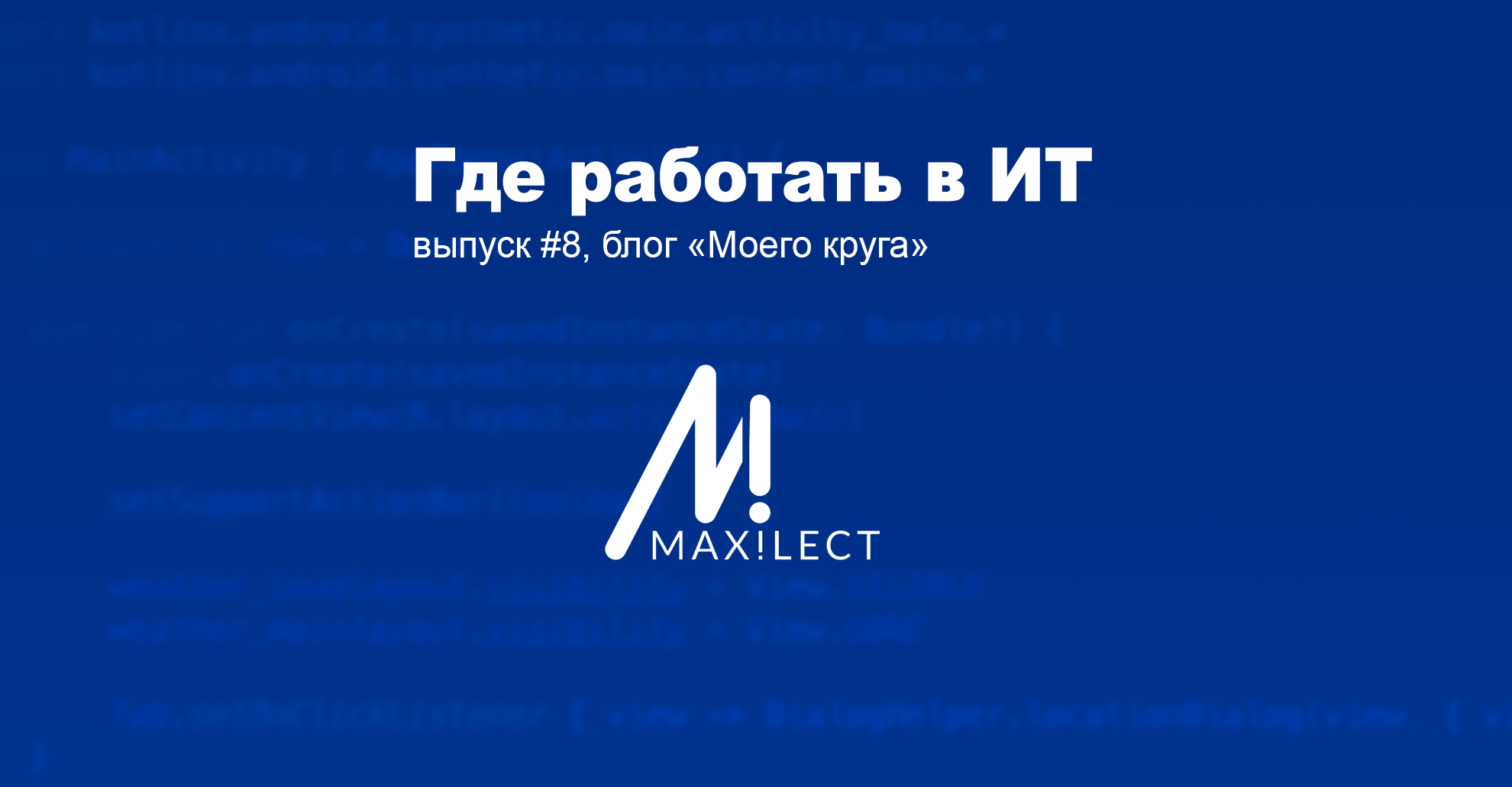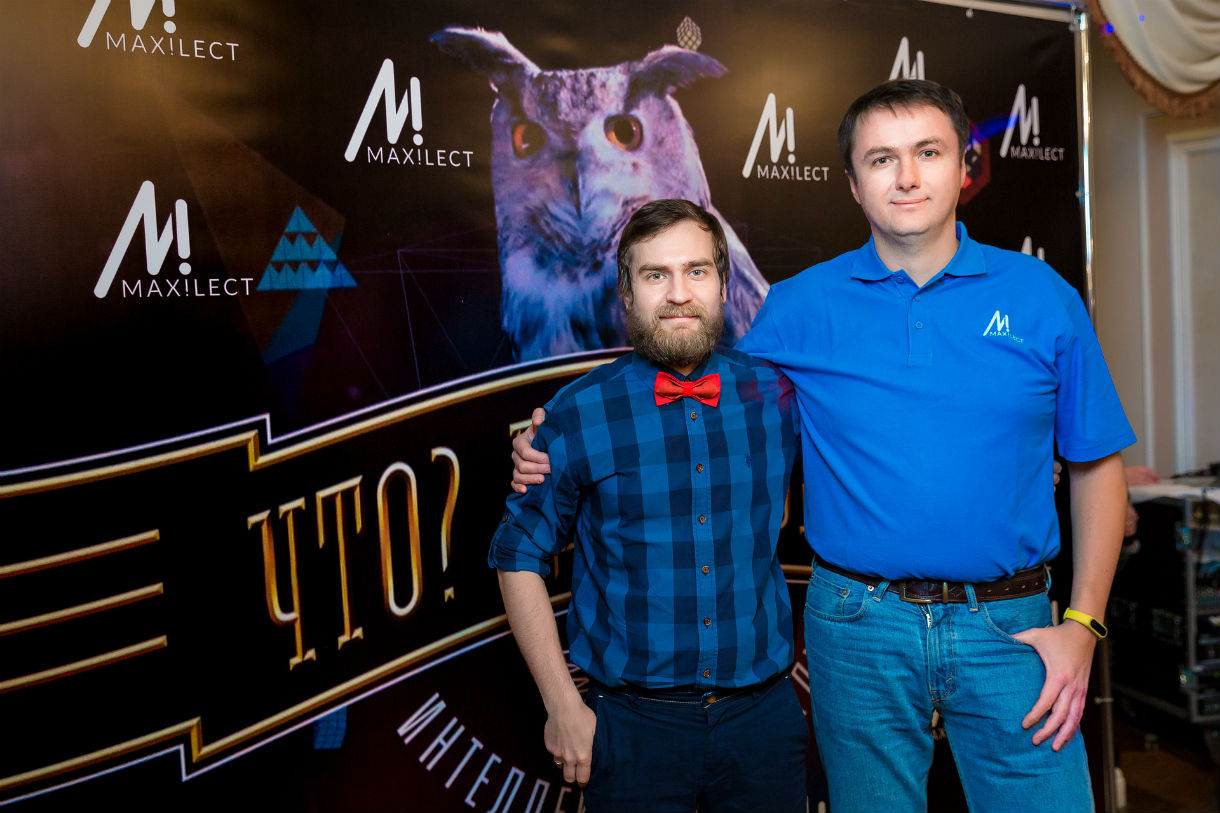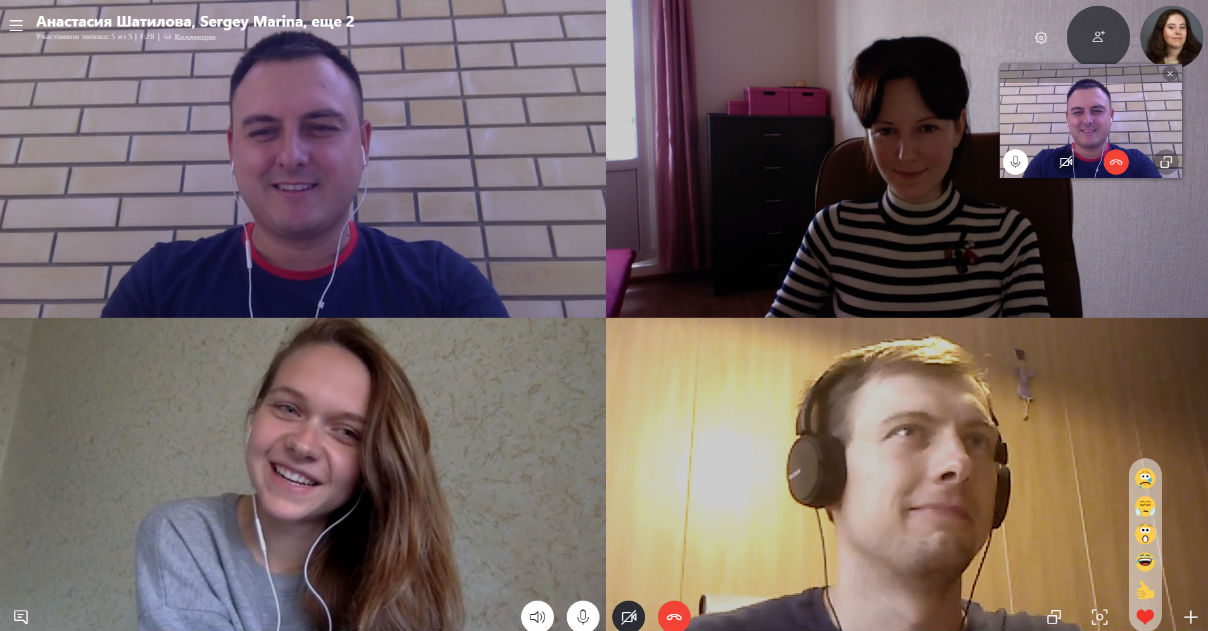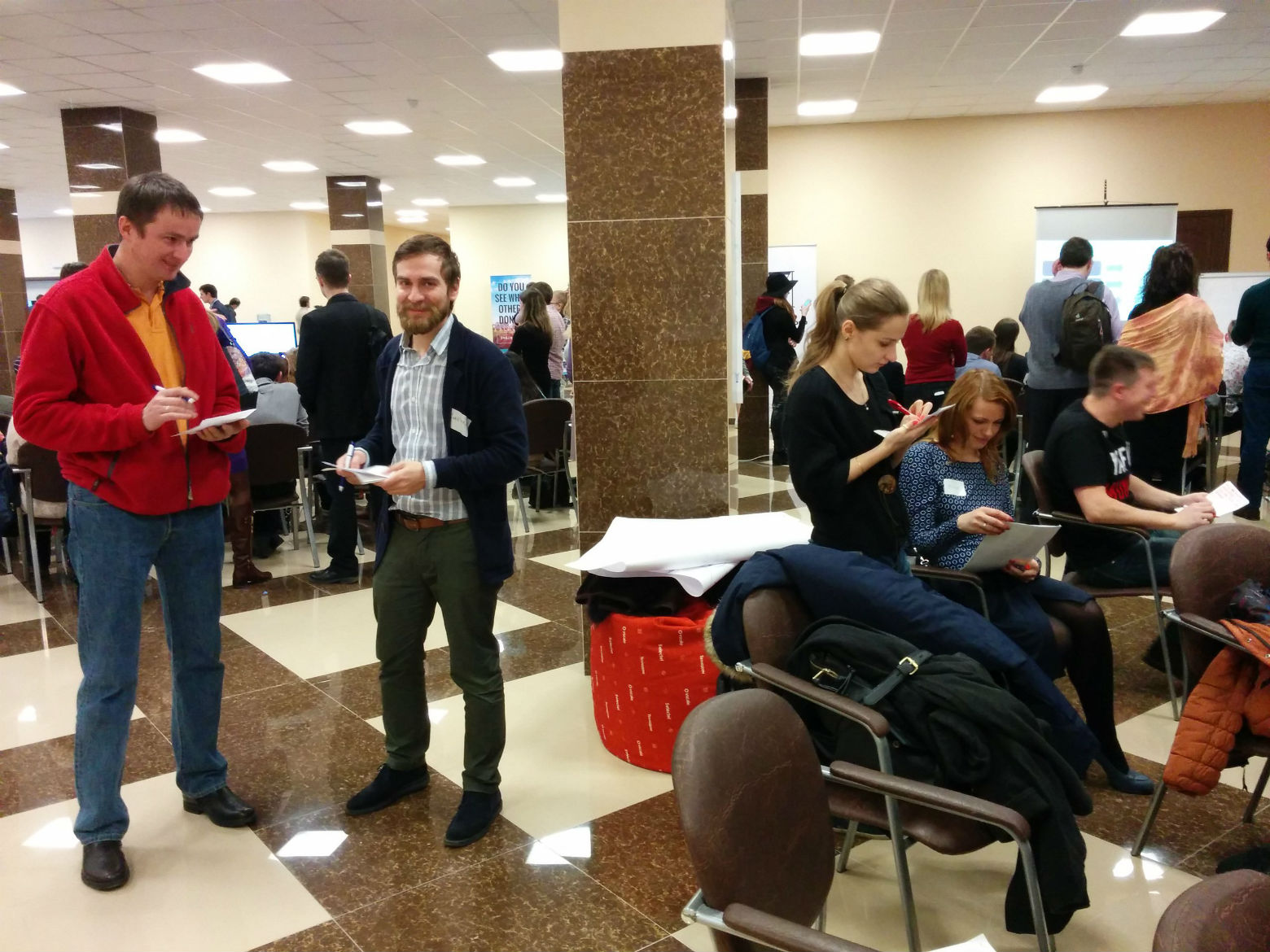Do service companies dream of their products? Conversation with Maxilect

It seems to me that many good developers and engineers at least once thought about what to do with their knowledge and skills in a global sense. Find an idea and create your own important and cool thing, for which even the word "product" seems petty and vulgar. Or go with your knowledge to other people and help them realize their ideas.
Both ways are good, both have pros and cons. But around both their own stereotypes form. For some reason, “making a grocery start-up” sounds romantically cool, and “making a service company and writing code on order” is utilitarian, down to earth and even soulless for someone.
I spoke with Maxim Korotkov, founder of Maxilect, about his experience between the two. After an unsuccessful experience with his product, he founded a service company, while he does not want to grow it even to 200 people, although this affects profits directly. Why - in our conversation.
Maxilect was ranked among the best employers in My Circle IT with an average rating of 4.81 . Employees rated the company the most by such criteria as: modern technologies used in work, adequate remuneration of work, professional and career growth, and communication with the company's top management.

Maxim Korotkov, CEO of Maxilect.
I am a mathematician by education. He studied at the physics and mathematics school, then Matem, computer science, programming. Then he worked as a developer. Almost immediately he left for the states where he lived for 15 months. He returned in 2001, worked as a Java programmer for another 5-6 years, then became the project manager. Received a business education in 2008-10. I traveled to the experience exchange program in Beijing.
Then ambitions grew, and problems began with finding a job. What I did before was not interesting, but what I wanted to do was not given to me. I wanted to do marketing and sales, but it didn’t work out. Several times a person with experience was taken in my place, although I did some good tasks.
In 2009, I tried to make my own product, and spent a lot of time analyzing, preparing a business plan, meeting with investors - just not creating the first version of the product. In general, I did everything that is taught in a business school, but at the start you need to think less and do more.
Then I was offered a remote job as a project manager. I doubted whether I could work remotely, but I agreed, and probably did the right thing. So he managed projects - seven, ten, or even fifteen pieces at a time. About a year later, I began to expand the project office, and in fact already served as the operational director. I offered the owner to give me a share in the business - I was ready to move the business of the company even more, but did not hear mutual understanding. It was the end of 2014. I left, realizing that the next job would be unlikely to be better. He felt a dead end in his professional development.
- In difficult times you left.
I had savings. I also earned on that collapse. In the seventh-eighth years I worked in a company that was engaged in trading, so I knew what futures were. He opened an account and earned a good ruble-dollar pair.
He lived - did not bother and was already starting to think about his business, although he went for interviews by inertia. I also understood that everything that was taught at a business school should be overlooked when you create a company from scratch. You just need to work hard - 14-15 hours to start.
I knew my strengths and weaknesses well and understood that I needed a partner, and preferably two. I chose the guys, called in a cafe, made a presentation on my knee and sold them the idea of creating a company.
- Were these friends?
Creating a business with friends is a bad story. These were former colleagues. In the beginning, the thoughts were different, from tenders in the Russian market to communications and Upwork.
We rejected tenders because we already understood how everything works there. We had few chances - at that time we did not even have LLC. For Russian business, IP is like bombers. And if it’s LLC, then it’s kind of like checkers, a company with which you can deal.
Therefore, Upwork and communications were chosen, but in the first months, mainly Upwork. Found the first projects, earned a reputation, received the top rated mark. But they also realized that we won’t make money there.
- Why?
There is very fierce competition. We went a certain way, made our way through the crowds of Indians and Pakistanis. But on Upwork, they are very dumped, and the bets that we could get were enough only for payments to specialists. There was nothing left for development. Although I know, there are companies that successfully work there. But many of them started working long ago, when Upwork was still not so saturated. A business

trip to Los Angeles in November 2018.
And we were still a stateless company. In 2016, we decided to open the LLC after all, and we started the first projects from Russia. At first, these were orders through acquaintances - they worked with someone before, were friends with someone. To our surprise, the orders turned out to be a decent amount. I would never have thought that acquaintances might have connections that projects will give.
The former leader told me: business is talking. We must communicate, we must talk about what you are doing.
But we also understood that such a sales channel is finite. We began to build a marketing plan. They relied on the creation of BI (Business Intelligence) - systems for collecting, storing and analyzing data. Next added and ML (Machine Learning). Then it was hype. We negotiated, about 10-15 at the same time, and it seemed that they lasted forever. In Russia, corruption, switch-breaking, inability and unwillingness to make decisions, eternal crises are primarily in the heads.
Life is finite, so in 2017 we pulled the stopcock and dropped all of these topics. Understood that we need something else. We initially wanted to make difficult decisions. They didn’t want to deal with websites, there is no money - it is difficult to compete with students. A complicated development attracts interesting personnel. And in the future, it worked correctly.
Outsource your product or development
From the very beginning we were interested in several areas:
- Advertising technology (AdTech). Creating solutions for the effective sale and purchase of online advertising.
- Financial technology. In complexity, these are systems of the same order. There and there is a high load, you can’t lose data, zero delay for what we do, scalability.
- The third area is blockchain. What was hype, but was already declining. We decided not to deal with cryptocurrencies, but used the blockchain to build the ultimate solutions. Business applications where it is not far-fetched for the sake of marketing, and where it really is needed.
- We also subcontract. This is not shameful, even good, especially for start-up companies. For many, the sales department is gaining more than they can digest, and we, albeit for less money, but work. This format allows you to create the backbone of the team.
- We are working on a team expansion model. Banks, insurance companies and other large companies have a problem with resources - no matter how many offices they open in Russia, there are still not enough specialists.
- If you had experience with your product, why didn’t you try again? I think it’s more interesting for an engineer to do his job.
Why didn’t we start with products? This is commonplace. To start a business, you need capital. The idea to create your own startup, to take money from an investor - I have already worked out similar things, I decided not to make a second attempt. We do not delete this for ourselves, but the main reason - I did not want to risk a few more years of my life.
A service company where we provide software development services is also not bad. Maybe it's not so interesting, there is a linear dependence of profit on the number of employees, the business is very complex. It cannot be said that it is better or worse - it is different.
This is twofold. There are statements, wishes that I want a product development. But you need to understand - there are products where developers can sit for several years and get bored. And even degrade. Then they will want to do something else, but the product company has no other.
“But this is a bad scenario.” And he may be good.
Why bad? If a person works for several years on one project, he will be bored. This is the risk of food companies. Yes, at the start it’s interesting to create a product, the dynamics of development are different. There are no jokes from an external customer. But after several years, people get tired of one project - this is a fact.
I have a lot of interviews, and developers from food companies come to us. They say that they want different projects, because they have already sat on one thing, the technologies are outdated.

Meeting in St. Petersburg in December 2017
- Your decision to leave programming and try marketing - was this not the result of burnout?
It was. For three days in a row I looked in the mirror and realized that I did not want to go to work, although it seemed to be a cool team. I personally did not like programming, as a process, I liked the result.
Maybe this is satiety. Everything becomes a chore, any craft. You worked as a turner, made stools, as in school labor lessons. It is interesting to make the first stool, the second - not so much. So, probably in any profession. It happens sooner or later.
- You understand that many cool people with whom you work can also come to this sooner or later.
They can, therefore, we regularly communicate, build trusting relationships. I don’t have a door, we are a distributed team. Write a letter, call on Skype, we’ll talk.
How a small service company makes money
On different projects, we use different models of earnings. In addition to the classic pay for time and resources, there are several unusual ones:
- With startups, we can work on a profit sharing model. This situation is when we, as partners, provide support in terms of technical solutions and in the future we want to participate in profits.
- Or we can work on the model of the fixed price (Fixed Price). Immediately call the cost of work and according to the results we take no more and no less. To do this, you need to carefully study the requirements, give an accurate assessment of the cost and timing. Thus, we take on more risks.
- At Fixed Price, we can work as consultants. There is more work of a business analyst who helps the client build a product vision, a high-level description of the system from a three-page outline, so that on this basis they can give an accurate assessment and start working.
- Fixprice - is it very risky?
This is tin. But this shows the company's readiness for complex projects. And this makes it possible to make a decision from scratch, choose an architecture, and sometimes even earn more than the usual scheme. If we are confident that we can manage and manage risks, then the profitability of projects will be higher.
- The die is hanging on the site that it costs from $ 15,000. Is it just to get attention? The figure does not seem real.
This is for cutting off, if we are talking about startups, so that companies with a budget of 200 thousand rubles and a desire to "do something" do not go to us. It is not economically viable.
“Does that not cut off good companies on the contrary?” They see the figure and understand that it is not serious. For this money, nothing can be done.
There is “from”. And if we do marketing campaigns in the west, then we use other brochures that show examples of projects for one hundred thousand and two hundred.
- That is, the real fixprice is much more?
Yes, but on that die, it’s not just about fixprice - it can even be about any project budget.
- How long does the project take on the fixed price?
Depends on what needs to be done, how clearly the requirements are formulated. We did MVP from two to six months. Two is a very small project. Six months is already more serious, possibly with the division into several projects.

Meeting in St. Petersburg in December 2017. Founders of the company
- Are shares in startups not even more risk?
Of course. But when there is already a service company that generates income, you think that you will do this for a few more years, and then it will become boring. And perhaps it will be an inefficient expenditure of life time.
The attempt that was with my product is not forgotten. It was a great time, I danced and sang, blissed out from what I was doing. But, unfortunately, this did not end there. Although I remember very well how I felt. I hope life allows me to try again. But this will already be an attempt where I will work to share profits, or act as a developer, investor, or all together.
- Why I see it as risky. It is one thing when you invest free money and wait for the result. Another is when you invest your main asset - the time of developers. You can put all the time in several startups, not one will shoot, and you have not earned money anywhere else all this time.
All right. But this is if you set the goal of making money, rather than creating something for which you will be remembered. The company that I tried to create in 2009 was a part of me. I invested my life, strength and emotions, all the money, I went into debt.
I also give myself to work at Maxilect, and it's not just about money. It's about how you live. For example, the fact that we work remotely allows me to live in the countryside for six months. I packed my bags in May, since the back-rats don’t go to school yet, and left before October. Cool? Cool.
If you think about investments, then, of course, there are more risks. But the possible gain is greater. The profit of a service company depends on the number of employees directly, but I'm not sure that I want to grow the company even up to two hundred people. This will be another business, contact with the guys we work with will be lost.
But according to the profit sharing model, we have not yet begun working with anyone, have not found those with whom we are ready. Nevertheless, this idea has not died, we will definitely do it further.
- Today what brings you more profit?
Now - work on a model for expanding teams. This is stable, and the projects that we do according to the fixed price and for the hours worked are shorter and riskier.
- 40 people are few. But it seems that you have a lot of projects. Are there enough people?
When you work for three years, and two of them - at least 14 hours a day, you have time to do a lot of things, both good and wrong. We used to grab onto all the projects. A lot of what we have in the portfolio, only in the portfolio, looks beautiful. But this is such a financial pain, which is better not to recall.
Now we understand that it is better to have fewer clients, but more profitable ones.
- Do you still work for 14 hours?
Not. I deliberately made a decline when I had a second child. Plus, I was exhausted, I realized that I could just burn. In addition, a team of managers has appeared who can delegate part of the activity.
Control and trust in remote work
- Until now, many companies believe that a normal process without an office cannot be built.
This is strange, because the synonym for udalenki is a distributed team. And if a company has more than one office, then basically teams are built using people from different offices. They already essentially work on a remote site. It is just a matter of control.
Or the employees are paid for the time spent in the office under the strict eye of the head, who pumps up the working atmosphere. Or they work for the result.
And if the result is, then what is the problem? Let them work even from the office, even from home. The udalenka market is now changing dramatically. And companies are releasing more and more employees home.

Workshop, autumn 2018
- I heard, on the contrary, the companies were burned and they are returning everyone to their offices.
As they say, they just don’t know how to cook properly. If you take a large company - they mostly make noise - and just send all people to a remote place, then this will be an epic file. 80 percent will not be able to work outside the office. They have no developed skills of self-organization, self-responsibility, self-education. And they really get lost. Other reasons will most likely be mentioned, but the results will sag. Inability to focus will kill working hours.
Those failures that I heard about, ostensibly the trend of udalenka has passed - hype and peak have passed. Even if there is a recession now, this does not mean that the remote market has stopped. It will develop, but more consciously. It is easier for us in this regard - we were initially created as a distributed company.
- When you say that companies do not know how, is it a problem for managers or developers who are not ready?
This is probably a problem of corporate culture. If it was laid incorrectly initially - basic values, norms - then people will be chosen incorrectly. When everything is imprisoned for a distance, people have the result in their head, responsibility, but at the same time complete trust and respect. I'm really not interested in what is on the screen of a person. Does the result and does. Everything.
I can’t imagine myself in a situation where they tell me - you work, and we write your screen. I would quit a minute after I heard it. This is disrespect to me. In 1998, at my first job, my manager walked behind me and watched what I was doing. He was a German, and I turned, said in my broken English - "no." He understood me and didn’t do that anymore.
It is necessary to correctly approach the issue of selecting specialists, build values, norms, spend more time not on testing technical skills, but on checking software skills.
- I read your article , how is your udalenka organized, and read the comments on it. It seems to many she seemed contradictory. You say “there is no control”, but between the lines it shows that there is quite a lot of control.
Roughly speaking: “you come to eight-nine in the morning, work until six-seven in the evening, and if you do not succeed, you should report it. You must agree on how much lunch you have - an hour or two. ” Such things often sound like control.
It depends on the project. Either internal, where we all determine ourselves, or this is integration with the customer, where two companies form one team. And very often there are restrictions on tools, and on processes, and on working time. It does not go to extremes, but people should be available for communication, since team work is going on. At the start of the project, when there is an exchange of knowledge, as a rule, you always need to be online.
These restrictions may not be for everyone, but only for those who communicate with the customer - team leaders, analysts. Developers and testers may have more autonomous mode.
- When specialists work according to the model of expanding teams, do they work according to the conditions of the company they are working for?
These are joint terms and contractual obligations of us and the company. If we see that we can somehow change the processes, then we offer improvements.
- People often say that they are annoyed by frequent calls, meetings, meetings. Have you encountered this?
In this regard, everything is simpler. Meetings are an order of magnitude smaller than in large companies, and I have not heard complaints about this. Meeting managers have more. I probably have the most. For the rest - only by necessity.
I am opposed to meetings. If you can decide without them, then you need to decide without them. Only those who influence decisions need to be called to meetings. The rest can be informed later. The amount of unnecessary communication is reduced by common sense.
- And how do you monitor the effectiveness?
Tasks are set, approximate terms are agreed. If the specialist is new to the team, then there may be intermediate checks. And those who have been working for a long time already have more confidence. You can wait at least a week and know that in response you won’t hear “I’ve been looking for a solution to the problem for four days”.
- That is, the developer is tasked, in a week he comes up with the result, and what, how and when he did it - doesn’t matter?
Yes. It all depends on how much confidence the Timlid has in him. If there is trust, then why not, let it be. Why control if you are sure of the result. When you can’t find a solution, ask for help yourself. But if you are a senior, you probably won’t have any questions every two hours, and you don’t have to pull everyone.
We do not work with the Joons, but not because we do not like them. Just for udalenka you need to have experience in commercial development.
Hiring as a Sales

With partner Kirill at a meeting in 2016
- In your articles, I saw dissatisfaction with how the hiring was arranged in the companies that you saw.
Yes, I probably even had a personal insult. When I was looking for work, I went through a lot of interviews, and saw huge disadvantages. I remember cases when I was even asked to fill out some form. This is tin. You come, and you have no desire to communicate further.
Then you talk to a girl recruiter who has no idea about business, about what the company does, what kind of technology it is. And then they pickle you, don’t answer or write “you don’t fit our company”, although they didn’t even tell me about the company at the beginning of the interview.
In general, all this was remembered, and I decided that we would have a recruiting department as a sales department. That is, candidates are potential customers. A lot of processes from the field of marketing can be transferred to the recruitment department.
At some point, I could not long achieve the formation of a unique value proposition for candidates, why they should work in our company. I realized that the eychars cannot formulate it, and if they cannot, then probably they cannot fulfill the functions of the eychars. Therefore, he sat down, wrote himself, and we reduced the position of the head of the HR department. Now we have only recruiters. The operations director and development manager work very closely with them.
Recruiters are clearly assigned a task; they do not ask what is not needed. Communication with them does not cause negative emotions. I hope so.
- That is, their task is to sell a job?
Sell a company. The second task is to conduct basic screening. First of all, on the subject of soft skills. And ask simple questions to cut off those who know nothing.
- It seems to me that developers do not like when theoretical questions are asked by those who do not understand them at all. They are interested in talking to an engineer.
Yes, but engineers have their own tasks. There is a limit that they are willing to spend on an interview. Of course, I heard that many would like to come and immediately chat with everyone, right down to the CEO. But this is generally difficult to implement.
- What should be the perfect job interview?
It should be an open conversation where there is no stress. The candidate should be able to ask questions. The recruiter should talk about the company at the very beginning of the conversation in order to calm and stand on the same wavelength. Tell us how we work, what projects can be. He must answer the questions of the candidate himself.
Then he must conduct the second part, which will show whether it is already interesting for us to communicate with the person. This is all in the framework of one interview.
- And how many stages do you need, for example, to the senior developer to get into the company?
Initial communication with a recruiter, then a technical interview strictly on technology. After each step, a report is filled. We have a funnel where everything is automated. Responsible is reassigned, and then the technical director of the company enters. He already talks in more detail about the project. If this is ok, then the options are different. When the customer is the operations director, he communicates as follows. If not him, then I communicate.
It turns out four to five stages.
- People are not scared away by so many? This is a long time.
Probably someone scares. If we wanted to expand the funnel of interviews, maybe we would simplify the requirements. But we do this consciously, realizing that we need about ten percent of those who are looking for work. And few of them are ready to work by our standards. Finding people is difficult - but it is not easy for everyone now.
The task is simplified for us because we are not geographically attached. The only thing with the project in the Moscow zone will be difficult to work with Kamchatka.
- How long do these stages take?
We tried to reduce the time from the first contact to the time when we make an offer. I guess I'm the main botnek here. But we try to keep within two weeks. There have been cases and faster - if a high priority, then we can handle it in a week.

Meeting in St. Petersburg in December 2017.
- You don’t worry that they will talk about your company with disdain - “is this just another outsourcing office”?
Let them talk. But this is not true, we have other projects. Let me show you other examples, except for us, where companies were created from scratch, without investment and without withdrawing customers. I heard statistics that 90% of companies in Ukraine were created by withdrawing customers from employers.
If we do everything as we did - with a bunch of mistakes, wrong decisions, millions of lost money - then it's hard for me to imagine how you can survive, get through this death valley without outsourcing at least at the start.
This gives both customers and the opportunity to create a team, and even small, but profit. The guys who have been working for a long time have seen how the company is changing. And as projects that suit them better emerge, we rotate and take them to other projects. Maybe we will live to see the products.
- In ideal conditions, where you don’t need to think about business survival, according to personal feelings, is a product or outsourcing better?
I believe that three years were not spent in vain; I proved to myself that I can do this. But if you ask - to create another service company or product, then I will choose a product.
